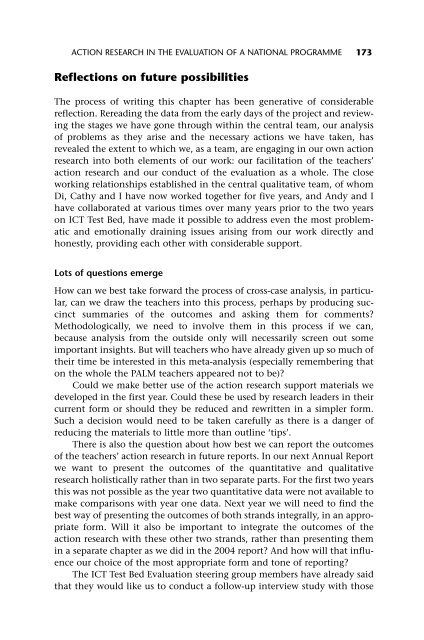Action Research A Methodology for Change and Development
Action Research A Methodology for Change and Development
Action Research A Methodology for Change and Development
Create successful ePaper yourself
Turn your PDF publications into a flip-book with our unique Google optimized e-Paper software.
ACTION RESEARCH IN THE EVALUATION OF A NATIONAL PROGRAMME 173<br />
Reflections on future possibilities<br />
The process of writing this chapter has been generative of considerable<br />
reflection. Rereading the data from the early days of the project <strong>and</strong> reviewing<br />
the stages we have gone through within the central team, our analysis<br />
of problems as they arise <strong>and</strong> the necessary actions we have taken, has<br />
revealed the extent to which we, as a team, are engaging in our own action<br />
research into both elements of our work: our facilitation of the teachers’<br />
action research <strong>and</strong> our conduct of the evaluation as a whole. The close<br />
working relationships established in the central qualitative team, of whom<br />
Di, Cathy <strong>and</strong> I have now worked together <strong>for</strong> five years, <strong>and</strong> Andy <strong>and</strong> I<br />
have collaborated at various times over many years prior to the two years<br />
on ICT Test Bed, have made it possible to address even the most problematic<br />
<strong>and</strong> emotionally draining issues arising from our work directly <strong>and</strong><br />
honestly, providing each other with considerable support.<br />
Lots of questions emerge<br />
How can we best take <strong>for</strong>ward the process of cross-case analysis, in particular,<br />
can we draw the teachers into this process, perhaps by producing succinct<br />
summaries of the outcomes <strong>and</strong> asking them <strong>for</strong> comments?<br />
Methodologically, we need to involve them in this process if we can,<br />
because analysis from the outside only will necessarily screen out some<br />
important insights. But will teachers who have already given up so much of<br />
their time be interested in this meta-analysis (especially remembering that<br />
on the whole the PALM teachers appeared not to be)?<br />
Could we make better use of the action research support materials we<br />
developed in the first year. Could these be used by research leaders in their<br />
current <strong>for</strong>m or should they be reduced <strong>and</strong> rewritten in a simpler <strong>for</strong>m.<br />
Such a decision would need to be taken carefully as there is a danger of<br />
reducing the materials to little more than outline ‘tips’.<br />
There is also the question about how best we can report the outcomes<br />
of the teachers’ action research in future reports. In our next Annual Report<br />
we want to present the outcomes of the quantitative <strong>and</strong> qualitative<br />
research holistically rather than in two separate parts. For the first two years<br />
this was not possible as the year two quantitative data were not available to<br />
make comparisons with year one data. Next year we will need to find the<br />
best way of presenting the outcomes of both str<strong>and</strong>s integrally, in an appropriate<br />
<strong>for</strong>m. Will it also be important to integrate the outcomes of the<br />
action research with these other two str<strong>and</strong>s, rather than presenting them<br />
in a separate chapter as we did in the 2004 report? And how will that influence<br />
our choice of the most appropriate <strong>for</strong>m <strong>and</strong> tone of reporting?<br />
The ICT Test Bed Evaluation steering group members have already said<br />
that they would like us to conduct a follow-up interview study with those

















